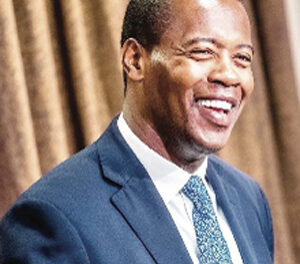By Megan Sayles,
AFRO Business Writer,
msayles@afro.com
The Biden-Harris Administration invited members of the Black press to the White House on Feb. 10 for a debriefing of President Biden’s 2023 State of the Union address.
To kick off the day, officials reflected on the legacy of Harry McAlpin, who became the first Black reporter to gain admittance to a White House press briefing in 1944 with the help of a petition from the National Negro Publishers Association (NNPA).
The White House expressed its appreciation to the Black Press for their ongoing efforts to hold lawmakers accountable and to keep African-Americans communities informed.
Over the course of the debriefing, senior officials and cabinet members from the current administration discussed the economy and funding opportunities from the bipartisan infrastructure bill and the CHIPS and Science Act.
Here’s a rundown of the key takeaways from the day:
The Economy
- Overall, the economy is currently in a strong position, particularly as its still recovering from the COVID-19 pandemic
- At 3.4 percent, the unemployment rate is the lowest it’s been in four years and more than 500,000 jobs were created in January; Black unemployment is at 5.4 percent, a record low
- While there may be some slight bumps over the course of 2023, the Federal Reserve expects that interest rates will continue to come down, and significant progress will be made to get the rates back down to the standard 2 percent
- The Small Business Administration (SBA) has reaffirmed its commitment to support Black businesses, and President Biden has a goal of increasing federal contracts with small disadvantaged businesses by 10 percent
- Republicans in Congress have opposed hiking the U.S. debt ceiling without spending cuts, but if the limit is not increased it will cause an economic catastrophe nationally and globally
Infrastructure Bill
- Passed in 2021, the bipartisan Infrastructure Investment and Jobs Act is in the middle of deploying $1 trillion across the American economy to rebuild roads, bridges and railways; increase civilians’ access clean drinking water; and mitigate the effects of the climate crisis
- The bill is expected to add an average of 1.5 million jobs per year over the next decade
- $65 billion will be used to secure access to reliable high-speed internet for every American
- $17 billion will be used to modernize the country’s airports and seaports
- There is a focus on providing African Americans and other marginalized communities who have been historically underrepresented in the construction trade with well-paying jobs on projects funded by the bill
- Funding from the bill is being used for the replacement of the Baltimore and Potomac Tunnel, which was designed in 1873; The new tunnel will be named after Maryland abolitionist Frederick Douglass, and it’s capacity is expected to triple once the project is completed
CHIPS and Science Act
- The U.S. is primarily focused on increasing its investments in infrastructure, science and technology
- Currently the U.S. imports the bulk of its semiconductors from Taiwan; The bipartisan Chips and Science Act, ratified in 2022, will provide $52.7 billion for domestic manufacturing of semiconductors, or chips that are essential to computers and all electronic devices
- Funds will be deployed as cooperative agreements, loan guarantees, subsidies and grants; To be chosen, recipients must exhibit considerable investment in workers and communities, particularly with small businesses and underprivileged communities
- The bill also increases federal funding for historically Black colleges and universities (HBCUs) to conduct research; Government agencies must submit a report on how they plan to increase HBCUs’ capacity to compete for grants, contracts and cooperative agreements
- Increasing domestic production of semiconductor is critical to strengthening the supply chain and national security
- A notice of funding for the Chips and Science Act is expected to be put out before the end of the February
During the debrief, senior administrators also discussed the war in Ukraine, education and police reform.
Megan Sayles is a Report for America Corps member.
Related Content:
The post White House hosts Black press for debrief of State of the Union appeared first on AFRO American Newspapers .










